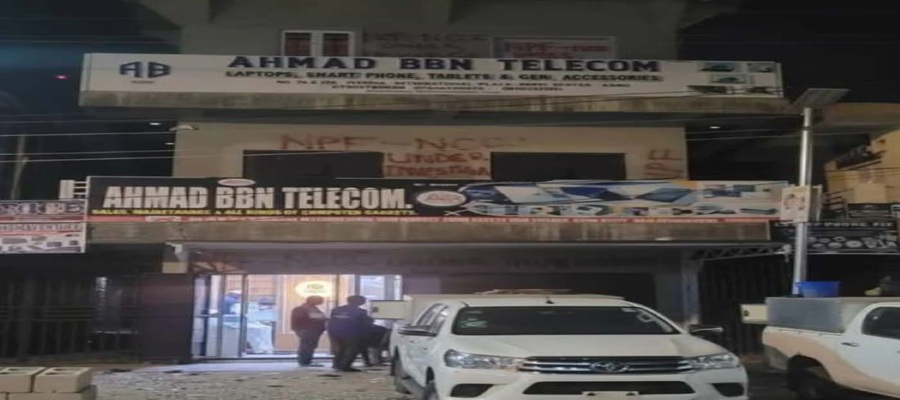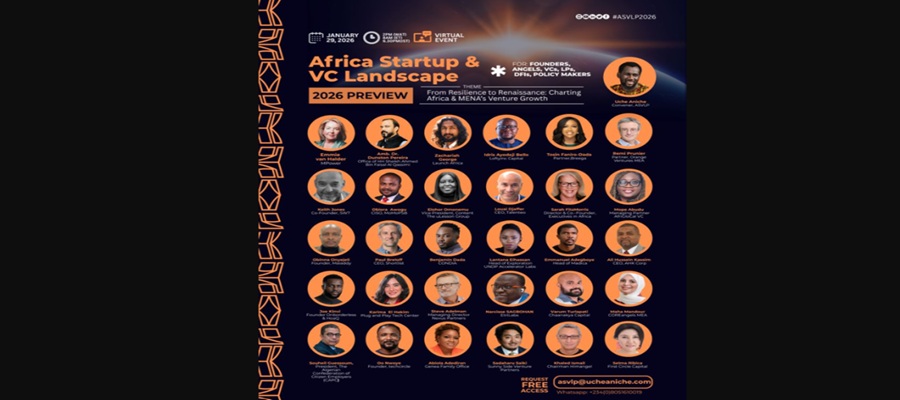Telecom
WSIS Review: Nigerian ICT Leaders Urged to Shape Global Digital Future

Stakeholders in Nigeria’s Information and Communication Technology (ICT) sector have been tasked to actively engage in the World Summit on the Information Society (WSIS) review process.

This call was made by Dr. Jimson Olufuye, Principal Consultant at Kontemporary Konsulting Ltd and Chairman of the 2025 Nigeria DigitalSENSE Africa Forum on Internet Governance for Development.
The call was made during the forum held at the Welcome Centre Hotels, MM International Airport Road, Lagos, on Thursday, June 19. The Nigeria DigitalSENSE Forum series, hosted by the internet corporation for assigned names and numbers (ICANN) certified At-Large Structure (ALS), DigitalSENSE Africa, under the Africa Regional At-Large Organization (AFRALO), is powered by ITREALMS Media.
The WSIS review aims to assess progress made since the summit’s initial outcomes in 2003 and 2005, focusing on key areas such as digital divides, internet governance, and sustainable development.
Olufuye also encouraged Nigeria’s ICT stakeholders to participate in the review process, sharing their experiences and insights to shape the country’s digital future.
By engaging in the WSIS review process, Olufuye who is member of the United Nations’ Multistakeholder Advisory Group, said, Nigeria’s ICT stakeholders could contribute to shaping the country’s digital landscape and ensuring that the benefits of technology are equitably distributed.
The stakeholders have also been urged to explore opportunities for collaboration and partnership to drive technological development and economic growth.
The WSIS review process, he underscored, is expected to culminate in future high-level events, where world leaders and ICT stakeholders will gather to review progress and outline future directions.
This event will provide a platform for stakeholders to discuss key issues, such as digital divide, Internet Governance, cyber security among others.
In addition to fostering the Sustainable Development by leveraging digital technologies to achieve the Sustainable Development Goals (SDGs)
He recalls that some countries have already conducted WSIS reviews, providing valuable lessons and insights for Nigeria.
In 2015, he recalled that there was a WSIS+10 Review by the UN General Assembly to conduct a ten-year review of the WSIS outcomes, which reaffirmed the WSIS principles and called for a further review by the Assembly in 2025, hence countries like Nigeria should take the review seriously.
Olufuye further pointed out that by participating in the WSIS review process, Nigeria’s ICT stakeholders could help shape the country’s digital future and ensure that the benefits of technology are equitably distributed.
Welcoming participants earlier, the Lead Consulting Strategist, DigitalSENSE Africa and Group of ITREALMS Media group, Ogbuefi Remmy Nweke noted that the 16th annual forum began since 2009, which has continued to rally Internet stakeholders to address challenges in Internet Governance, security, and socio-economic impact, focusing on students, youth, women, and community-based organizations.
Focus, this year, he said, was on the Global Digital Compact (GDC), a globally significant UN initiative that demands global effort and urged Nigeria to take lead in this transformation, at least from the African continent.
“The GDC calls us to commit to bridging digital divides, inclusive digital economy, open, safe, and secure digital space; international data governance and Artificial Intelligence (AI) to name a few,” he said.
Nweke also appreciated participation of esteemed speakers, including Dr. Jimson Olufuye, Mr. Muhammed Rudman, Mr. Gbenga Sesan and Mrs. Tinuade Oguntuyi, among others.
NDSF 2025, he said, was hosted in partnership with the Internet Corporation for Assigned Names and Numbers (ICANN) via the African At-Large Regional Organisation (AFRALO), Nigerian Communications Commission (NCC), Association of Licensed Telecommunications Operators of Nigeria (ALTON), Internet Exchange Point of Nigeria (IXPN), Internet Society Nigeria chapter, NLNG, NNPCL, Digital Realty, and Nigeria Computer Society (NCS), among others.
Telecom
Amazon Axes 16,000 Jobs Worldwide in Major Restructuring Push

Amazon, the world’s largest e-commerce and cloud computing powerhouse, announced plans Wednesday to eliminate 16,000 jobs globally, escalating a restructuring drive first flagged in October with 14,000 earlier cuts.

Amazon
The layoffs, hitting corporate ranks across multiple divisions, aim to slash management layers, boost accountability, and dismantle bureaucracy, Senior Vice President Beth Galetti stated in an internal memo. Despite booming holiday sales and $21 billion quarterly profits on $180 billion revenue, Amazon seeks to redirect resources toward massive artificial intelligence investments amid slower post-pandemic growth and rising costs.
Galetti explained that while some teams finalised October adjustments, others required extended reviews, pushing total reductions toward 30,000—the firm’s largest ever. CEO Andy Jassy, pursuing leaner operations since 2021, has long signalled AI’s role in shrinking white-collar headcount, with corporate staff—about 350,000 of 1.5 million total—bearing the brunt, sparing warehouses.
The move mirrors Big Tech’s broader belt-tightening as firms recalibrate pandemic-era hiring binges against economic headwinds, AI disruption, and policy uncertainties under President Donald Trump. Amazon’s October cuts struck 2,000 in Washington state—including engineers, recruiters, analysts—and 1,500 in California, with fresh impacts undisclosed by location.
Jassy emphasised culture over pure finances in prior notes, blaming rapid expansion for excess layers after workforce doubling during COVID lockdowns fueled online shopping surges. Recent U.S. hiring slowdowns—to 50,000 jobs in December—underscore corporate caution amid AI’s job-shifting potential and tariff worries.
Analysts note the cuts free capital for AI dominance, pitting Amazon against rivals in generative tools despite no immediate financial distress. Ex-workers have decried impersonal processes, often learning via media leaks, highlighting tensions in Earth’s “best employer” shedding talent en masse.
As tech pivots to AI frontiers, Amazon’s aggressive pruning signals a new era: fewer bodies, sharper focus, betting machine smarts eclipse human scale in the post-boom landscape.
Telecom
Police Bust ₦7.7bn Telecom Hack Gang, Seize 400 Laptops in Massive Fraud Swoop

Operatives of the Nigeria Police Force smashed a sophisticated cybercrime ring Wednesday, arresting six suspects accused of hacking a major telecommunications company and looting airtime and mobile data worth a staggering N7.7 billion.

The Force Public Relations Officer, CSP Benjamin Hundeyin, disclosed in a statement that the suspects breached the telecom giant’s core billing and payment systems by compromising internal staff login credentials, enabling them to siphon off vast quantities of airtime and data for illicit resale.
Named in the arrests are Ahmad Bala, Karibu Mohammed Shehu, Umar Habib, Obinna Ananaba, Ibrahim Shehu, and Masa’ud Sa’ad – a mix of northern and southern names hinting at a cross-regional fraud network that preyed on Nigeria’s digital backbone.
Police swooped on the gang’s hideouts in coordinated raids across Kano and Katsina states in October 2025, with a final takedown in the Federal Capital Territory, recovering two mini-plazas masquerading as legitimate retail outlets stocked with over 400 laptops, about 1,000 mobile phones, and a Toyota vehicle.
Investigators also froze substantial sums in the suspects’ bank accounts, tracing the dirty money trail back to the diverted resources that left the unnamed telecom firm reeling from unauthorised activities reported in a desperate petition.
The breach, described by police as a “calculated assault on critical infrastructure,” allowed the hackers to manipulate the company’s systems undetected for months, offloading billions in airtime and data bundles through underground channels and raking in illicit profits.
Hundeyin vowed that the net was widening, with forensic experts combing through digital footprints and financial ledgers to expose any remaining accomplices or beneficiaries in what he called “one of the largest telecom heists in recent Nigerian history.”
Inspector-General of Police, IGP Kayode Adeolu Egbetokun, praised the crack team from the National Cybercrime Centre for their “relentless professionalism,” urging telecom firms to bolster cybersecurity amid a surge in digital predation.
As the suspects cool their heels awaiting arraignment under the Cybercrimes (Prohibition, Prevention) Act, the case underscores Nigeria’s growing battle against tech-savvy fraudsters targeting the N1.7 trillion telecom sector that powers millions of daily transactions.
Industry watchers warn that such breaches erode investor confidence and hike operational costs, ultimately passed onto consumers already grappling with soaring data tariffs in Africa’s most populous nation
Telecom
ASVLP 2026: Africa, MENA VCs Gear Up as Tech Funding Hits $4.1bn Rebound

As Africa and MENA’s startup ecosystems transition from post-correction resilience into a new phase of disciplined growth, the Africa Startup & VC Landscape Preview (ASVLP 2026) will convene leading founders, investors, policymakers, and ecosystem builders on January 29, 2026, for its second annual, agenda-setting virtual forum.

Following a challenging global venture cycle, 2025 marked a notable rebound across the African ecosystem, with startups raising an estimated $3.2–$3.3 billion over the full year.
The recovery was accompanied by significant structural shifts: Kenya emerged as the leading destination among Africa’s “Big Four” markets for the first time, while Nigeria recorded a year-on-year funding decline, reflecting changing investor preferences, macroeconomic pressures, and a broader recalibration toward capital efficiency and sustainability.
Sectorally, fintech remained the most funded vertical, while climate & energy, AI-enabled solutions, healthtech, and infrastructure-adjacent businesses gained increasing attention. Across Africa and MENA, development finance institutions (DFIs) and family offices played a more pronounced role in anchoring funds, deploying catalytic capital, and supporting blended-finance structures, reshaping how early-stage and growth capital is mobilized.
ASVLP 2026 is designed to translate these data points into forward-looking strategy.
The forum will bring together venture capitalists, angel investors, LPs, DFIs, family offices, founders, corporate leaders, and regulators from Africa, MENA, Europe, and North America to assess 2025 outcomes and chart priorities for 2026.
The program will feature keynotes, fireside chats, panels, and deep-dive roundtables, including discussions on:
· The 2026 Africa & MENA FinTech Landscape, focusing on security, profitability, regulation, and growth frontiers
· Emerging Fund Managers, capital formation, and LP alignment
· Talent, operator depth, and institutional capacity as constraints to scale
· Regulatory evolution and cross-border market integration
A major highlight of ASVLP 2026 will be the Final DealRoom Pitch Session, where a curated group of high-potential startups will present to an experienced panel of investors.
• Founders can apply to pitch via: bit.ly/ASVLP-DR-Founders
• Investors seeking DealRoom access can request entry via: bit.ly/ASVLP-DR-Investors
Confirmed speakers for ASVLP 2026 include Khaled Ismail (HIMangel), Idris Ayodeji Bello (LoftyInc Capital), Zachariah George (Launch Africa), Tosin Faniro-Dada (Breega), Selma Ribica (FirstCircle Capital), Maha Mandour (COREangels MEA), Joe Kinvi (Borderless), Remi Prunier (Orange Ventures MEA), Karima El Hakim (Plug and Play Tech Center), Souheil Guessoum (President, The Confederation of Citizen Employers – Algeria (CAPC)), Remi Prunier (Partner, Orange Ventures, MEA), Maha Mandour (COREAngels MEA), Ali Hussein (President, Kenyan FinTech Association), Patrick Okebu (CIO, Interswitch Group) among other leading voices shaping capital, policy, and innovation across the region.
“The conversation has shifted,” said Uche Aniche, Convener of ASVLP. “It’s no longer about whether capital will return to Africa and MENA, but what kind of capital, deployed with what discipline, and in service of which long-term outcomes. ASVLP exists to help the ecosystem make sense of that transition.”
Participation in ASVLP 2026 is free but strictly by invitation.
Interested participants are encouraged to repost the official announcement on LinkedIn and comment #ASVLP2026 to receive a private registration link. They could also email [email protected] and request invite.

 E-Financial3 days ago
E-Financial3 days agoCBN Upgrades Licences of Opay, Moniepoint, Kuda, Palmpay, Paga to National Status
- E-Financial3 days ago
Nigeria’s 9 Top FinTech Firms Valued at $10.6Bn in January 2026

 News3 days ago
News3 days agoTech Executives Double Down on AI, Talent and Adaptive Strategies to Lead in the Intelligence Age

 E-Financial3 days ago
E-Financial3 days agoNIBBS to Boost Financial Inclusion with Offline Payment Solutions

 News3 days ago
News3 days agoDHQ Indicts Brigadier General Abubakar Sadiq, 15 Others in Alleged Coup Plot againt Tinubu

 E-Financial2 days ago
E-Financial2 days agoPayPal Goes Live in Nigeria through Paga

 E-Business3 days ago
E-Business3 days agoFirm Identifies AI as Common Denominator in Entertainment Industry’s 2026 Security Threats

 Broadcasting2 days ago
Broadcasting2 days agoNITDA, NBC Explore Strategic Collaboration on Digital Transformation, Media Regulation



























